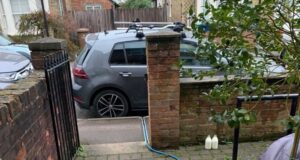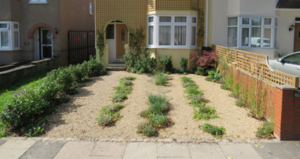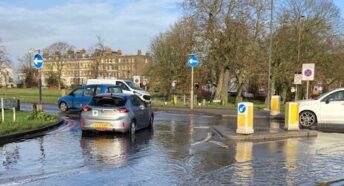Dismay over Richmond front garden parking policy change
Environmental campaigners are dismayed by Richmond Council’s recent decision to make it easier for residents to convert their front gardens for car parking, including removing the parking stress test, the minimum distance from a junction and significantly reducing the minimum size of garden which can be considered for conversion.
The current minimum width of garden which can be converted for parking will be reduced from 7.2m to 4.8m and depth reduced from 6m to 4.8m. The minimum proximity of junction will be reduced from 15m to 5m. And the parking stress test requirement will be abandoned.

CPRE London is working with the Ealing Front Gardens Project to raise the profile of the serious environmental problems created by front garden parking, including flood risk and loss of habitat. CPRE London wants to see changes to planning policy and law to restrict conversion of front gardens for parking, promote reinstatement of front gardens, and even promote or mandate installation of SUDS planters to manage rainwater from roofs.
- We’ve set out what boroughs should be doing, and what you can do, at the bottom of this article.
But first, Richmond.
One reason the council took the decision to make it easier to convert front gardens is they wanted to tackle illegal front garden parking. Apparently some 2,000 households are using front gardens for parking without consent. We believe councils should monitor and enforce against illegal front garden parking, not enable householders to make them legal where the problem arises.
Richmond also says it wants to help people charge electric vehicles (EVs) from their homes. But this can be accommodated via pavement gullies, which enable people to charge their car safely when it’s parked on-street. They say they are trialing gullies, but that front garden charging is also needed to promote take-up of EVs. But gullies are clearly better if they avoid loss of front gardens.

The council says it makes sure permeable surfaces are introduced to ensure flood risk is not increased, and that it requires 10% soft landscaping. But evidence shows permeable surfacing often does not actually stop rainwater run-off into road drains, particularly during deluges; and 10% is not enough to make a substantial difference.
Conditions
Of course councils do have to abide by the law which does allow residents to apply for a driveway (technically a ‘pavement crossover’). But they can set conditions to ensure, among other things, that cars fit into the space (and pathways to front doors are not blocked in case of emergency); that other road users including pedestrians are not put in danger; and that enough space is left on the street for other things including on-street parking.
Richmond has weakened the conditions to accommodate cheaper EV charging and resolve a historic problem with illegal front garden parking. It should instead enforce illegal activity, reinstate the stronger conditions it had in place before (which were good) and focus on pavement gullies to enable EV charging.
In summary, Richmond’s weakening of conditions is designed to enable more front garden conversions. And that’s not what we need.
So why is front garden parking an environmental disaster?
Ealing campaigners have been working with the London National Park City movement for some time to point to the issues. They have set this out very clearly in their blog 43 reasons. We also summarise the key issues here.
FLOOD MANAGEMENT. One of the biggest challenges facing London is an increase in high rainfall events. Paving over front gardens exacerbates what is already a crisis in drainage capacity. Theoretically, permeable paving can be used to absorb rainwater, but the reality is most permeable surfaces quickly become impermeable and in any event don’t absorb enough water, or don’t absorb it quickly enough in high rainfall events. Gardens need, instead, to have as a high a proportion of space given to plant/flower beds, which can absorb water much more effectively. Genuinely permeable surfaces can also be used around beds.
HABITAT AND GREENERY. Another huge challenge facing London is loss of nature. Nature needs habitat and front gardens can make an incredibly important contribution to that: they account for around a quarter of total garden space in London.
CLIMATE AND HEALTH. Too much car traffic has left London with poisonous air and sky-high carbon emissions. That’s why London’s transport strategy aims to reduce the proportion of trips made by car from 40% to 20% by 2041. Front garden parking makes it easier for households to own, park and drive a car, and even to accommodate more than one car. Making car parking easier, electric or not, is simply taking us in the wrong direction.
PUBLIC RIGHTS. Where roads and pavements are publicly owned and managed – which is most of them – the installation of front garden parking effectively privatises the road and pavement in front of the house because it has been turned into a driveway for that house. It means that section of pavement or road cannot be used for anything else like a tree or cycle parking, or indeed car parking. Councils don’t allow car owners to have sole use of the parking space in front of their house. But creating a driveway is doing exactly that. Added to this, pedestrians are meant to have priority. But front garden parking gives priority to car parking, often leaving pavements uneven, and always creating danger on the footway.
ELECTRIC VEHICLE CHARGING CAN BE ACCOMMODATED IN OTHER WAYS. We do need to promote a shift to electric vehicles but primarily we need to promote a shift away from car use and car ownership. Electric or not, we need fewer cars. Our primary focus should be enabling public transport, walking and cycling. Not car ownership and driving.
ATTRACTIVE STREETS. Green front gardens create pleasant places people want to live and contribute to better mental health of residents
The legislation on front garden parking is very clearly designed to make it easier to own and use cars and keep traffic flowing. It is a barrier to the kind of changes we need. However, even within this unhelpful legislation, boroughs CAN take positive action to restrict front garden parking and even promote the reinstatement of front gardens.
Here’s what boroughs can – and should – do:
- Use the legal precedent set by the London Borough of Kensington & Chelsea and refuse to permit crossovers on the grounds that they reduce the amount of parking available to the community as a whole.
- Set front garden parking conditions which realistically reflect modern issues: i.e. small front gardens can’t accommodate large vehicles; they should fully take account of road danger; they should be able to accommodate a large amount of soft landscaping; high quality pavement crossovers should be installed which don’t make the pavement surface uneven; parking stress tests should ensure controlled parking zones are not compromised i.e. can still be effectively introduced; the real costs / total cost of applying for and building a driveway (pavement crossover) should be charged to the resident (currently many councils charge below cost, effectively using taxpayers’ money to subsidise private driveways).
- Promote reinstatement of front gardens, for example enclosing a leaflet when new owners move in, perhaps via the Council Tax registration system, and even offering a discount if the new owner reinstates the garden wall and creates plant/flower beds or even SUDS planters. Set up or support incentives for people to reinstate their hard surfaced front gardens.

Long term, CPRE London wants changes to national legislation and planning policies to halt, or at a minimum significantly restrict, conversion of front gardens for parking – and to promote the reinstatement of front gardens to the attractive, biodiverse sponges they should be.
What can you do?
- Lobby your council to use the legal precedent set by the London Borough of Kensington & Chelsea, and refuse to permit crossovers on the grounds that they reduce the amount of parking available to the community as a whole.
- Lobby your council to set high benchmark conditions for conversion of front gardens, like those suggested in the section ‘what boroughs should do’ above.
- Report illegal crossovers and front garden parking to your council.
- Apply for Conservation Area status so that permitted development is withdrawn, and make sure front (and back) gardens are fully protected by strengthening existing Article 4 directions if necessary.
- Encourage low maintenance garden designs, garden competitions, and organise or take part in plant sales, exchanges and advice.
Set up or support community gardening services for people having difficulty with garden maintenance. - Set up or support incentives for people to reinstate their hard surfaced front gardens.









